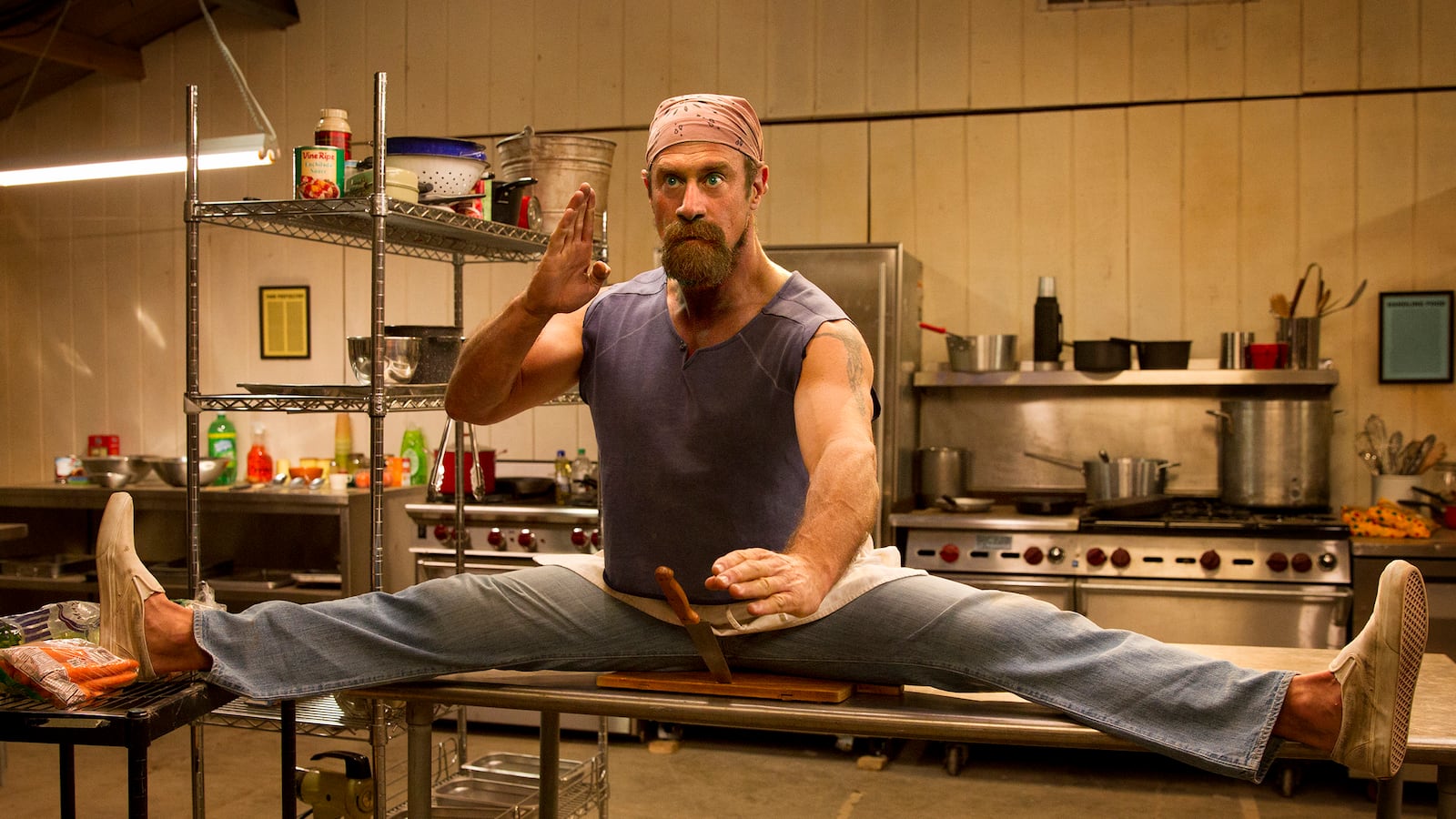A decade and a half ago, man-child Adam Sandler was king of the box office, Friends was king of TV, and a team of upstarts including Amy Poehler, Bradley Cooper, and Elizabeth Banks were licking their wounds after the failure of their camp masterpiece Wet Hot American Summer. (And by “camp,” I mean the camp with tents and barbecue, not drag queens mouthing along to bad dialogue—though there’s still a bit of that too.)
Today, with the unsurprising bomb of Sandler’s Pixels and the triumphant premiere of Netflix’s Wet Hot American Summer reboot, the tides are changing. It’s 15 years later and absurdist comedy rules once again.
American comedy was blessed early by the innovations of three masters—Harold Lloyd, Buster Keaton, and Charlie Chaplin—and in the hundred or so years since those men began making films, not that much has changed, give or take the inclusion of dialogue. Of the three, Lloyd was the action-comedy man; his movies made comedy out of dangerous physical stunts. If you’re looking for the way his comedy has survived, watch Melissa McCarthy’s Spy, where the bulk of the laughs come from wire stunts and fight scenes.
But it’s the influences of Charlie Chaplin and Buster Keaton that reign supreme over American comedy traditions. Chaplin created a stable world where he was the element of chaos. His films just as often relied on an audience’s sense of compassion and pathos as they did on their sense of humor. His Little Tramp character was as pathetic as he was heroic, but Chaplin taught us to love him. And once we loved him, we could laugh at him.
By contrast, Buster Keaton wasn’t interested in making a myth of himself—instead, his films are about the absurdity and the spectacle of cinema. He was interested in the things the camera could do that people could not and in the inconsistencies between life and what gets put onscreen. So his comedies are spectacles of the surreal: houses turning on their axes, a man entering a movie screen, a car turning up at exactly the right moment to carry a guy away from a chase.
While Chaplin’s movies are funny and endearing because we recognize ourselves in him, Keaton’s films are funny because there are times we can’t recognize anything at all. It’s insane movie logic that keeps them going, not real world logic, and after years of Chaplinesque comedians dominating the cultural conversation, it seems the pendulum is swinging back and Keaton’s comedy of absurdism is here to stay.
TV’s return to the absurd probably started with Tina Fey and her NBC series 30 Rock, which incorporated meta-references like Arrested Development and built an entire comedic universe on the instability resulting from following corporate creatives’ rules. The laughs in 30 Rock often came from the dialogue. But just as often they came from the way Fey and co. manipulated the rules of their world to turn what might have been a traditional backstage comedy into something altogether more surreal. Liz Lemon’s not-quite run-in with Oprah; the mystery of Kenneth’s origins; Tracy Jordan’s visions of a blue person in a fluffy blue suit; any Jenna storyline in any episode of any season. For someone who has almost certainly never done drugs, Fey has an unusual disbelief in notions of reality. Fortunately, she also had the skills to realize that vision on a large scale.
While the shows that followed can hardly be considered What 30 Rock Hath Wrought, it’s also true that once 30 Rock ended, new comedies rose to the occasion and are now carrying the banner of the surreal. Most prominently is Inside Amy Schumer, in which Schumer uses a short-form style and her own sense of surreality to craft biting satires of femininity and sexism. And under the wing of Fey’s sometimes-collaborator Amy Poehler, one of the most promising shows to emerge in the last few years has been Ilana Glazer and Abbi Jacobson’s Broad City—a show which follows two toked-out twentysomethings through their disorienting adventures in New York. And there’s also Bob’s Burgers, which regularly dips out of its mom-and-pop shop everyday world to include the absurd fantasies of its kooky characters. But maybe no show embraces the absurd quite like Netflix’s Wet Hot American Summer, the sequel (and prequel!) to the 2000 film of the same name.
When Wet Hot American Summer premiered amid flat-out parodies like Scary Movie, straight comedies like Meet The Parents, and conventional satires like Best In Show, Michael Showalter’s vision of a summer camp populated by overgrown “teens” and Vietnam vets who talk to cans was confounding to audiences and critics alike. It bombed at the box office. Even now, despite its cult status, the film only has a 32 percent score on Rotten Tomatoes. To put that in perspective, that’s a lower score than what critics gave the Entourage movie—and critics hated the Entourage movie.
Netflix continues to make it impossible to know how many people are watching their shows. But their interest in continuing the Wet Hot American Summer tradition seems to indicate a solid place for the show in today’s comedy atmosphere. And why wouldn’t there be? Where the original film was an anomaly at the time of its release, right now the show is riding the wave of a cresting trend.
The things that made the movie Wet Hot American Summer idiosyncratic and confusing are now hilarious given our current comedy climate—the can, the conspicuously old actors, the montage of a trip into town that ends with all the main characters smoking in a crack den, then gleefully returning to camp with zero consequences. The show’s lunatic mix of highbrow and lowbrow—anarchy, chaos and surrealism, but building to a gag about a talking can—comes as a relief after years of comedies like Louie and Girls that are brilliant and funny but also desperately sad. Wet Hot American Summer has its cake and eats it too, and this time we’re ready to join in.
In 2000 we were riding a cultural high resulting from a good economy, the fall of our supposedly biggest international threat, and a relatively willful ignorance toward issues of environmental safety, race, and gender. Now those ideas have been blown up by global warming, ISIS, Ferguson, college rape statistics, and any other number of debilitating tragedies that our country has both befallen and perpetuated. What else is there to do but laugh about it? Surrealism is funny because it acknowledges the unstable, unsafe, unnatural world we live in and it makes it OK for us to laugh anyway.






